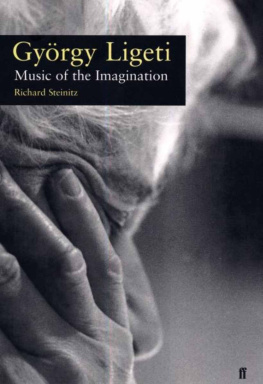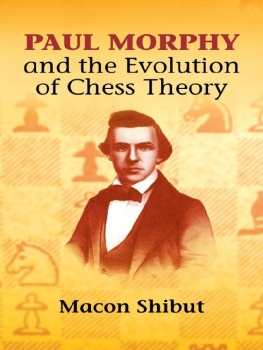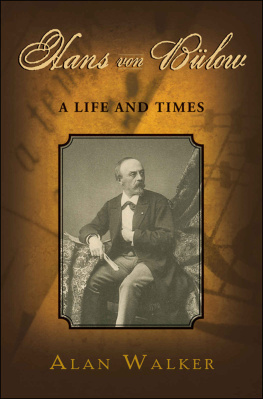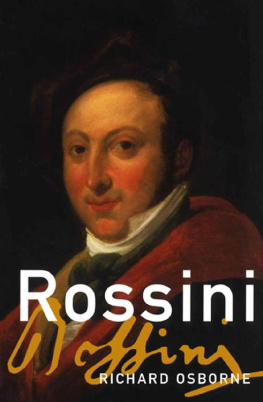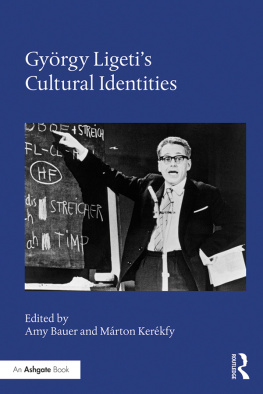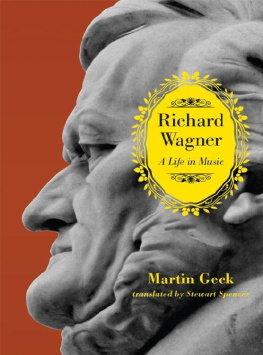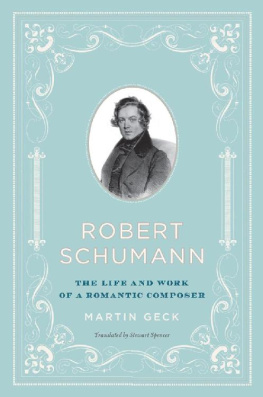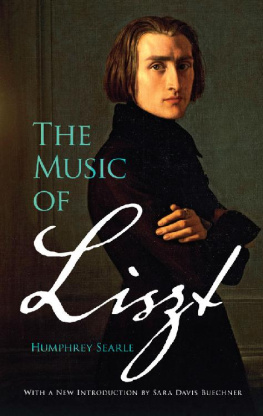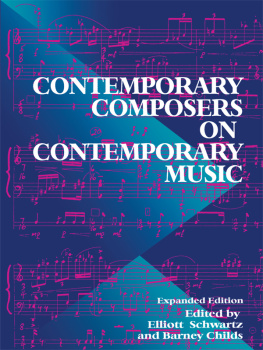Acknowledgements
It is eight years since I had the idea of writing a book about Gyrgy Ligeti. For most of this time it has had to compete with the demands of directing a large-scale international new music festival and my responsibilities as Professor of Music in the University of Huddersfield. The book would scarcely have advanced at all, had the University not granted me two six-month sabbaticals. In addition to the support of colleagues, I am especially grateful to two former students of the Music Department: Maria Fisher created all the computer-set music examples, and Philip Clarke read the whole of my final text, making many perceptive comments and suggestions.
This book is fifty per cent bigger than the one Faber and Faber commissioned in 1996. During the intervening years much has changed, not least the economics of publishing. The Music Editor to whom I proposed the idea was soon succeeded by Belinda Matthews, whose enthusiasm and patience has been a constant support. Only temporarily disconcerted when, after spending three days with Ligeti, I told her that I would rewrite the eleven chapters she had just approved, her unflinching encouragement as the book expanded beyond its brief I have much appreciated. In the final production stages, Kate Ward as desk editor has been a tower of strength. Grateful thanks also to my copyeditor Michael Downes, to Ilsa Yardley who read the proofs, Ron Costley who advised over layout and photographs, and Diana LeCore who compiled the index.
I first met Ligeti at Glasgows Musica Nova in 1973, and came to know him better when he was our guest at Huddersfield Contemporary Music Festival twenty years later and we engaged in two public discussions. Nevertheless, in 1994 as I was contemplating writing this book, I was surprised when Ligeti said that he would like me to undertake it. The extent of his involvement I describe in the introduction. Here I want to thank him for giving so much time to our conversations and to checking the accuracy of my text. To Dr Louise Duchesneau, Ligetis personal assistant, I am greatly indebted for facilitating our contacts and for much assistance in between, and also to the composers wife, Dr Vera Ligeti, for her comments and encouragement.
Not until the autumn of 2001 did I visit the Paul Sacher Foundation in Basle where most of Ligetis manuscripts are housed. The Swedish musicologist, Ove Nordwalls collection was transferred to Basle in the late 1980s, but Ligetis own much larger stock arrived only at the end of 2000. I am fortunate to have been able to consult this important archive in the Foundations congenial building overlooking the Rhine, where its staff, notably Robert Piencikowski, Johanna Blask and Evelyne Diendorf, were unfailingly helpful. Photographs and manuscripts from the archive are reproduced by permission of the Paul Sacher Foundation. This is also the place to express my debt to Friedemann Salliss pioneering work on Ligetis early sketch books and the music he composed in Hungary, and to the authors of other previous books and articles on the composer, including Robert Richarts bio-bibliography published in 1990. Assistance with the translation of texts was generously provided by Rachel Beckles Willson, Bela Simon and Alison Slade.
David Whelton, Managing Director of the Philharmonia Orchestra, kindly sent me the schedules for the orchestras extended Ligeti concert and recording project. He was shrewdly objective about what had gone wrong, as was Esa-Pekka Salonen in a long conversation. The most relevant week of this schedule I have described in detail. That British orchestras endure tough working conditions is well known; nevertheless, it may surprise some readers to discover how gruelling they can be. In recounting this unhappy saga at little of which I was present I have tried to be even-handed and accurate, but the judgments are my own.
Warm thanks also to the staff of Ligetis principal publishers Schott Musik International, especially to Sally Groves in London and Rainer Schochow in Mainz for the provision of materials and access to their records. The archive so efficiently maintained in Mainz was a valuable resource. Finally my thanks to John Minnion. Having encountered his caricature of Ligeti printed in the The Times in 1996, I was pleased to receive another which he had given privately to the composer, and delighted when he agreed we should reproduce them, and that he would make a third specifically to illustrate this book.
Introduction
Everyone rewrites their history. We want to rationalise our actions, to recall pleasure and success, and to exorcise pain. Memory is interpretative . Nevertheless, when writing about a living person, the recollections of its subject are a primary source. In this account of Gyrgy Ligeti, I have drawn extensively on the many published and recorded interviews with him, on documentary information, and on our private conversations recorded both in London and during three days in Hamburg.
Despite Ligetis earlier encouragement, it was it was with some trepidation that I sent him a draft of my first eleven chapters in January 2000. A fortnight later he telephoned and told me they were full of errors. I feared the worst. But, in explaining that I had failed to understand the complexities of growing up in a multi-ethnic and politically turbulent society, he also warmly endorsed the musical and aesthetic exposition which forms the bulk of the book. Reassured, I felt honoured to be invited to Hamburg to go deeper into the background. Ligeti was keen to correct inaccuracies and misconceptions already in print, especially about his early life. Some events he amplified at length, some he related for the first time. Elsewhere, he unstitched stories which others had embroidered. Our discussions of technical and stylistic matters, and about the wide range of extra-musical ideas that have stimulated composition, were fascinating. My musical analyses he approved without any substantial disagreement, and with helpful suggestions regarding terminology. Returning with thirteen cassette tapes of our conversations, I resumed my task. Later Ligeti read again a large proportion of the revised text, particularly on personal and historical matters, and sent me his unpublished autobiographical essay written to deliver in Japan on the occasion of receiving the Kyoto Prize in November 2001.
Is this a biography? It was not intended to be, but it has become one. My original intention was, and remains, to write a stylistic and analytical study of a wonderful body of music. But I wanted to explore its context: the political and artistic background, the climate of ideas, the relation to other disciplines, the childish fantasies that burgeoned into an overflowing imaginative vision, the questing technical renewal and self-imposed rigour that have made Ligeti take up to eight years to complete a new work. Gradually I realised that his personal life was in itself an extraordinary story, and that his bizarre experiences in Romania and Hungary had deeply affected his personality and attitudes.

